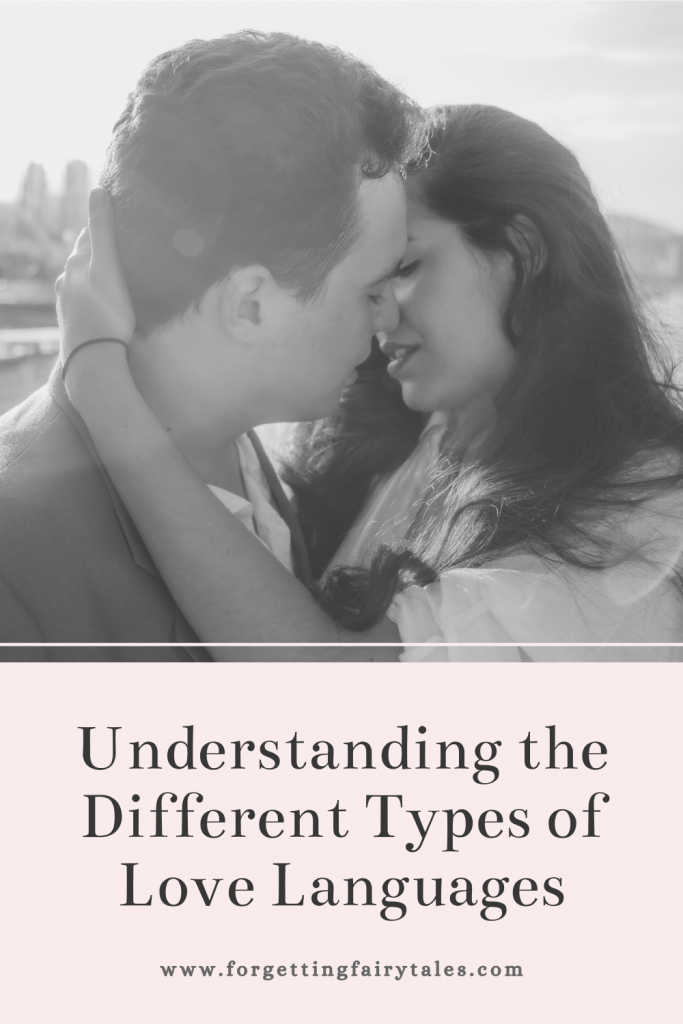So guess what – it turns out there are more languages than English, Spanish, Mandarin, etc. We also have Love Languages. Uh huh, according to best-selling author, Gary Chapman, we each have different ways in which we feel love. By understanding your love language, and how that matches against your partners, it enables you to create a love that really lasts. (Or so they say!) So let’s explore this further – looking briefly at the different types of love languages, how to identify your own, how to identify your partners and how to take what you’ve learnt to strengthen your relationship.
The Different Types of Love Languages
So what are the different types of love languages? In this post, we’re going to look at them, one by one, so that you can better identify and understand your love language. This will help you when both dating, and in a relationship – which we’ll briefly explore after for you too. Sounds good? Alright, let’s jump straight in…
1) Words of Affirmation
The first type of Love Language is Words of Affirmation. If you have this love language it means that words matter the most to you.
Hearing “thank you”, “I appreciate that” or of course, “I love you” is what confirms how your partner feels about you. If you hear the reasons for that love, appreciation and gratitude, then my word – it deepens your feelings even more!
If you have this Love Language, and also have an Anxious Attachment Style or battle with self-doubt / insecurity, it means you’re likely to need regular (or what might feel like) constant reassurance. But to you, it’s your way of feeling safe and secure. Hearing the same things more than once, doesn’t get old. It just reconfirms that your partner still feels the same way about you, and that matches the way you feel about them.
You appreciate simple complements, little recognition and praise. And these can be given not just face-to-face, but also over voice notes, texts, calls or in writing.
On the flip side, negative or insulting comments can hit you pretty hard which is why it may take you a little longer to forgive or forget these.
2) Quality Time
Next up, it’s Quality Time. If this is your Love Language, it means it’s all about having your partner’s undivided attention… even just for a little while! You see the value in it, and you need it in order to feel connected to them.
This calls for intimate date nights, with no phones, no tv, just the two of you, talking, sharing, listening, bonding. Or it may be days out – making special new memories together. It doesn’t always have to be big and bold though. Simply being in each others company – cooking together, making plans together, working on something as a team – that’s what you need. And you don’t need this and this alone…
You’re still happy to curl up on the couch to watch Netflix or your favourite tv series together! You’re not inhuman! It just means that you need to make sure you have a balance and still set aside time to spend together without any other the distractions. That’s what makes you feel comforted in the relationship.
If your partner is cancelling date, postponing time together or simply isn’t fully present during your time together, it can be extremely hurtful to you and makes you feel like they care more about these things, than you and your relationship.
JUST REMEMBER: Men retrieve for different reasons. [Click here to explore more about that in the ‘Understanding Men’ series.] So it’s not always something to take personal. We’ll also discuss this further later on…
3) Receiving Gifts
Another of the different types of love languages is Receiving Gifts. And no – it’s not about being shallow or materialistic. Instead, it’s more about what that gift represents.
See, you thrive on the love, thoughtfulness and effort behind the gift. In short – actions speak louder than words. When your partner gives you something that shows he/she loves or understands you, it reconfirms the words he/ she is saying, shows that they’re really listening and makes you feel all warm and fuzzy inside!
To you, the act of giving a gift, tells you that your partner cared enough to think about you in advance and go out of their way to get something to make you smile. You therefore appreciate the effort and gesture behind it. And it doesn’t always have to be something big and grand… It could just be your partner bringing home your favourite tub of ice cream if they know you’ve had a bad day!
This is different than Acts of Service however, where a person shows their affection by performing actions to help their partner. Let’s have a look at that one now…
4) Acts of Service
As briefly mentioned, this is one of the other different types of love languages. If you have the Acts of Service as your main Love Language, it means you feel loved when your partner takes time out and goes to the effort of doing something they know you will appreciate.
This usually means anything they do to ease the burden of responsibility – like vacuuming the floors, going grocery shopping or cooking dinner for a change!
It’s the simple thing that demonstrate your partner cares about you and your life together. You also want to know that they appreciate you and see the two of you as a team… Which is why you work together – especially in times of need.
You feel loved when your partner does things that they know you will be thankful for and it goes back to the ‘actions speak louder than words’ motto once more.
Actions out of obligation or with a negative tone are something else entirely however… And failing to take note or listen, leaving everything to you, will certainly also have the adverse affect!
5) Physical Touch
Last but not least, we have physical touch. If this is your Love Language, you thrive on any type of physical touch: hand-holding, hugs, touching of the arm or hand during a conversation. You like to physically FEEL the person in order to feel close to them.
(Which is why it’s a nightmare if you have this love-language and are in a long-distance relationship… ouch!)
Physical touch is the most direct way to communicate love – as long as it’s done in an atmosphere which is loving and not oppressive. Feeling this touch calms, heals and reassures you… even more so than the words that your partner could say.
You like intimacy, physical closeness and affection. This to you is the most impactful when it comes to feeling love, but like we said above – it doesn’t necessarily have to be over-the-top PDA!
So there we have it, our five different types of love languages. Before we go any further, have a think and try to identify which one sounds most like you!
If you’re in a relationship, you should also try to guess your partners – then discuss it with them to see what they think they are too. If you want to see how well you know your partner, have a go at this…
Do You Only Have One Love Language?
Nope, not always! I mean that would be FAR too simple right?! (Ha!) Like most things, our love languages aren’t always black and white.
We all probably appreciate each love language in it’s own right. They all make you feel good to a degree. But you may find that you have one main, dominant love language that rules above any other. You might also notice that you’re a strong, mix of two or more. Furthermore, you may have a broad mix qualities from all five. Each person is different.
The other thing to consider is whether you put out different love languages than you want to receive. For example, you may need Words of Affirmation, but find it hard to express this to others – which could in turn, prevent them from opening up to you. You see?
For this reason, it’s so important to start understanding your love language and expressing it with your partner. You also want to give love in the way you partner is most susceptible to feel it… and vice versa. So open up the conversation – help your loved one to recognise their love language and share this with you. It’s a great way to make positive changes in your relationship moving forward.
Do You Have To Have The Same Love Language As Your Partner?
So now you’ve gotten to grips on the different types of love languages – what does it actually mean? And I guess the big question is… do you have to have the same love language as your partner to make the relationship work easily?
Well no, not necessarily.
It’s just important that you understand your differences and work with your partner to ensure both of your needs are being met. Let me give you an example…
How The Different Types of Love Languages Can Clash
Let’s say your love language is Words of Affirmations. Let’s say you also have an Anxious Attachment style and are pretty insecure. This means that you worry a lot, and need regular reassurance – particularly in difficult situations where your relationship is tested and self-doubt sinks in.
Your partner on the other hand has the Primary Love Language of Physical Touch. He knows that what makes him feel good is affection – so he showers you with cuddles and kisses to try to stop you worrying, then wonders why it doesn’t work… and feels like his efforts aren’t good enough. [Click here for the difference in men and women and why they are fixers rather than listeners.]
This difference in Love Language will create problems in your relationship, but it’s all really down to a lack of understanding, you see?
Let’s Round It Up…
By understanding the way in which feel love, and knowing how your partner differs or is the same – you can both work together to express love in the way which means the most to your partner, which inevitably strengthens your relationship.
By also knowing that we each have different love languages, you will become wiser to the fact that sometimes, your partner may be trying to show you love, it just comes in a different way. Makes sense right?
For more relationship training and insights, subscribe to the blog below. We’ll then pop you an email every week or so, with posts that we think you’ll find valuable.
Recommended Reads From Here:
- How Well Do You Know Your Partner?
- The Ultimate Couples Question Game
- The Exclusive “Men Are From Mars” Series
All the best!
Love,
Ell_xx


